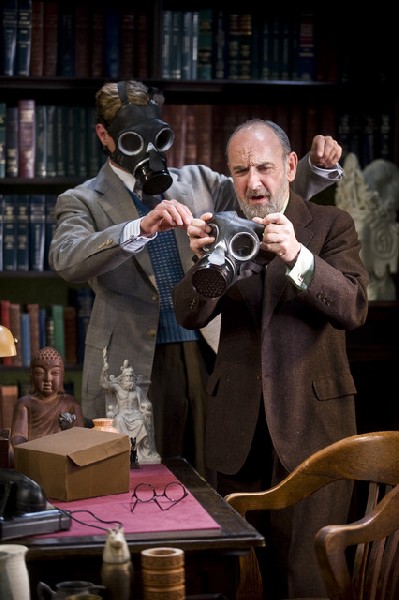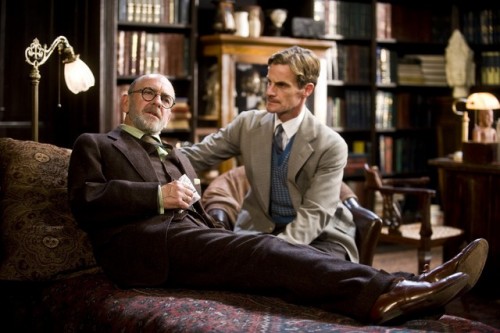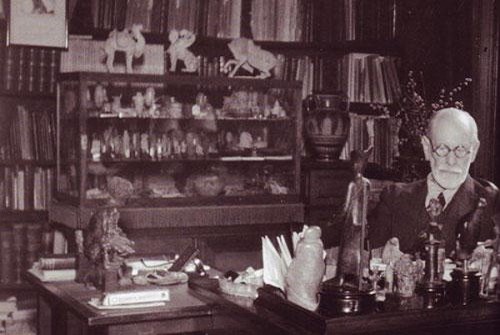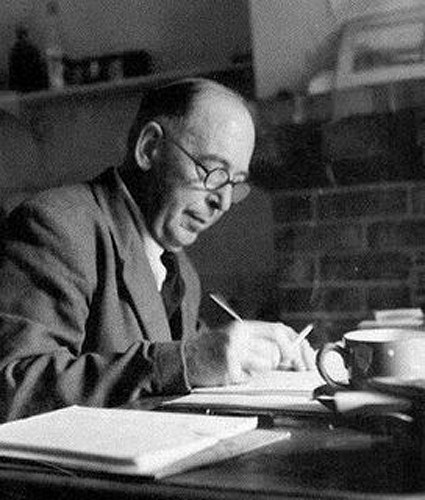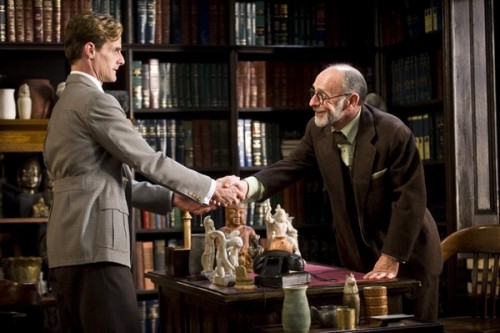Freud's Last Session at Barrington Stage Company
Freud Spars With C.S. Lewis About God, Sex, Suicide
By: Larry Murray - Jun 15, 2009
Freud's Last Session by Mark St. Germain, Suggested by The Question of God by Dr. Armand M. Nicholi, Jr. Directed by Tyler Marchant, Scenic Designer Brian Prather, Lighting Designer, Clifton Taylor, Costume Designer, Mark Mariani, Sound Designer, Beth Lake, Press Representative, Charlie Siedenburg, Casting, Pat McCorkle, CSA, Stage Manager, Kate J. Cudworth. With Mark H. Dold as C.S. Lewis and Martin tayner as Sigmund Freud. At Barrington Stage Company, Stage 2, 413.236.8888, June 10-28 plus extensions to October 4, 2009. Linden Street, Pittsfield, MA. 75 minutes, no intermission. http://www.barringtonstageco.org/
Barrington Stage Company has extended its 2009 season with a thought provoking evening that considers the existence of God and the choice between natural death and suicide. The World Premiere of Mark St. Germain's play pits the great mind of Sigmund Freud against that of the renowned author C.S. Lewis. Over the course of an hour and a quarter many familiar tropes are invoked, including war and genocide, sickness and suicide, family, love and the ultimate question of whether there is life after death. The discussion is set in 1939. 70 years later, the discussion continues. It is of course as unresolved as ever.The playwright based his work on themes from the book, The Question of God by Dr. Armand M. Nicholi, Jr. But this is no mere discussion between science and faith, it is the dramatic meeting of two very real and gifted geniuses whose search for truth and certainty mirror that of virtually every person who has walked this earth. The question colors the choice that Freud made to end his life through suicide shortly thereafter. A definitive answer is not achieved here, however. Instead, the debate is the thing. Never before have the two sides been so clearly defined, debated and ultimately deadlocked.
"I was the most reluctant convert in all England. There was nothing I had a greater hatred of than being told what to do. That was the wonderful attraction of atheism: it satisfied my wish to be left alone. The God of the Bible is a bullying Busybody." C.S. Lewis
Being a play about ideas, those involved with this production had to make some sacrifices to keep the spotlight on the concepts and not on themselves. The playwright had to stick to the facts, the actors had to subdue their performances so that the ideas sparkled rather than themselves, and the director had to keep things moving with subtlety, not showiness. So this is not a tour de force for the actors, nor an explosive battle between fundamentalists and Darwinists. Instead it is an evening that engages our minds more than our hearts. The genius of this evening of theatre is its willingness to sacrifice staginess for substance. Freud's Last Session asks the unanswerable, proposes the unprovable and in the end leaves us all pondering the questions of God, love, sex and the meaning of life.
The time and place for this encounter is the London home of Freud in 1939, after he fled Austria. He is suffering from the ravages of cancer and some three dozen painful procedures to remove tumors. His beloved daughter Anna is doing her best to tend him, even as she persues her own career. She has managed to recreate the look of his old study in a London flat and helps him cope. Though she is never seen, her presence is felt, and they phone back and forth. She does not know her father is considering suicide so that he can decide his own end, rather than sucumb to the disease.
"I'm saying I will kill myself before the cancer does. Don't look at me that way. You don't need to say it. Suicide is a wrong, and a sin. But look into my mouth and you will see Hell has arrived already." Sigmund Freud
The small playing space worked extremely well, with three chairs, a desk and the analysis couch providing sufficient landing spots for the actors to move around in. The bookcase and collection of Greco-Roman-Asian statuary is sublime, the lighting suitably atmospheric. The sound effects worked well, too, especially the roar of planes overhead and the radio broadcasts that periodically updated us on the war that was unfolding outside Freud's window.
As Freud, Martin Raynor kept his focus on the ideas even though it was clear that the great doctor was but weeks away from taking his own life. The damage to his ravaged jaw and palate, and the crude prosthesis which had been fitted was suggested by the actor's subtle coughing and absent-minded patting of the affected area. All the while, the discussion with Lewis raged back and forth. We see a bond slowly develop between the two men. Interestingly, it is based more on their being human beings than on the substance of the debate. At one point Freud asks Lewis to help him remove his painful prosthesis for a moment of relief. Normally only Freud's daughter, Anna, was allowed this embarrassing intimacy.
C.S. Lewis had his conversion to Christianity at age 33, and his writings, including The Chronicles of Narnia are considered celebrations of his faith. Having been an atheist, he was quite familiar with the usual arguments for and against the existence of God, and so was uniquely suited to enter into philisophical combat with Freud. Naturally the conversation quickly turned to the primary obsession of most modern Christian cults, sex, and Freud's own obsession with the subject. And then to matters of life, death and moral laws.
Throughout this encounter, Mark H. Dold plays Lewis as a gentleman, with the delicate (some would say effite) manners and deference that prevailed in the late 30's. For example, when Freud goes to answer his phone, Lewis rises, and moves to distance himself from the conversation out of politeness. Of course, in such a small study, this is impossible, but the symbolic attempt is so very characteristic of the times. In acting, such subtle touches can mean a lot. Finding the sweet spot between being deferential and wimpy to the older Freud while sticking to his own beliefs with ineffable politeness had to be a challenge to Dold, but find it he did. Bravo.
From its first previews this particular play has seemed to have struck a nerve with audiences, especially young ones. Capacity crowds have found the debate engaging. Among the questions that are dealt with are that of the creator, the conscience and the sources of happiness. Then it veers off to whether sex is strictly for procreation vs. pleasure, is love just a form of sublimated sex, and most important of all, whether death is our only destiny. Perhaps because so often the discussions surrounding these hot button topics get heated, snarky and even hostile, there is a refreshing honesty to St. Germain's approach. Both sides can have their say without resorting to name calling or fisticuffs.
Freud was a strong advocate of scientific atheism which he used in his lifelong battle with what he called the "religious Weltanschauung." He had an important role in the secularization of society. For his part, C.S. Lewis has been the most influential spokesman of recent times for a spiritual worldview and his books continue to sell prodigiously. Though the two men never debated directly, this play gives us an opportunity to contrast their ideas and beliefs, almost point for point.
Freud's Last Session is an evening of genius, bringing two great men together for the ultimate debate. Its restraint reminds us that it is possible to have meaningful discussions with each other about difficult subjects. Is there a door behind which the secret of the universe is waiting? What lies beyond? Some seventy years after this fictional encounter took place it remains undecided. Or does it? You should see this play before you decide.
Quick Link to Barrington Stage Company


